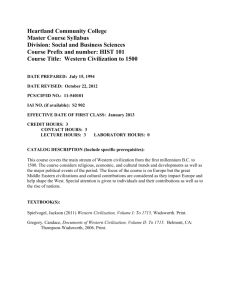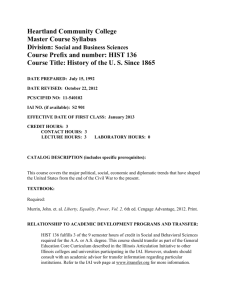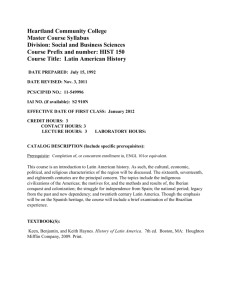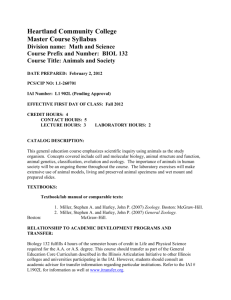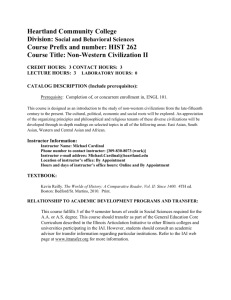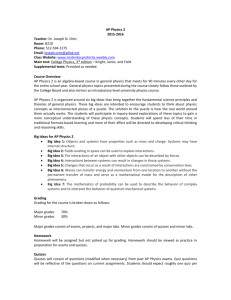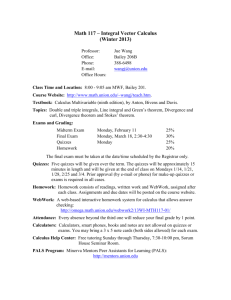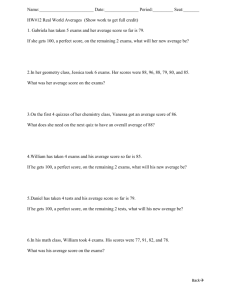HIST262_Feb2014
advertisement
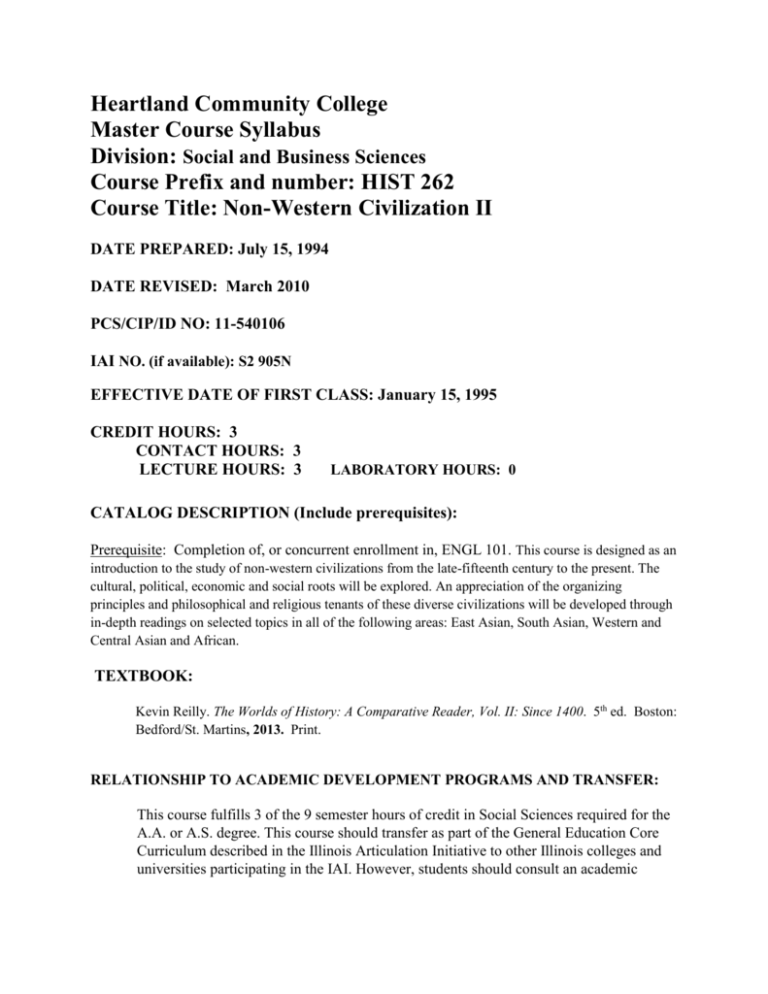
Heartland Community College Master Course Syllabus Division: Social and Business Sciences Course Prefix and number: HIST 262 Course Title: Non-Western Civilization II DATE PREPARED: July 15, 1994 DATE REVISED: March 2010 PCS/CIP/ID NO: 11-540106 IAI NO. (if available): S2 905N EFFECTIVE DATE OF FIRST CLASS: January 15, 1995 CREDIT HOURS: 3 CONTACT HOURS: 3 LECTURE HOURS: 3 LABORATORY HOURS: 0 CATALOG DESCRIPTION (Include prerequisites): Prerequisite: Completion of, or concurrent enrollment in, ENGL 101. This course is designed as an introduction to the study of non-western civilizations from the late-fifteenth century to the present. The cultural, political, economic and social roots will be explored. An appreciation of the organizing principles and philosophical and religious tenants of these diverse civilizations will be developed through in-depth readings on selected topics in all of the following areas: East Asian, South Asian, Western and Central Asian and African. TEXTBOOK: Kevin Reilly. The Worlds of History: A Comparative Reader, Vol. II: Since 1400. 5th ed. Boston: Bedford/St. Martins, 2013. Print. RELATIONSHIP TO ACADEMIC DEVELOPMENT PROGRAMS AND TRANSFER: This course fulfills 3 of the 9 semester hours of credit in Social Sciences required for the A.A. or A.S. degree. This course should transfer as part of the General Education Core Curriculum described in the Illinois Articulation Initiative to other Illinois colleges and universities participating in the IAI. However, students should consult an academic advisor for transfer information regarding particular institutions. Refer to the IAI web page at www.itransfer.org for more information. COURSE OBJECTIVES (Learning Outcomes): Outcomes General Education Outcomes Range of Assessment Methods Distinguish between primary and secondary sources as the foundation of modern historical scholarship in Non-Western Civilization from the late fifteenth century to the present. PS1 exams, quizzes, research paper, group project, other methods Interpret primary sources critically by CT3 analyzing their historical contexts. exams, quizzes, research paper, group project, other methods Formulate historical interpretations, CO4 both in discussion and in writing, and defend them critically with reference to primary and secondary sources. exams, quizzes, research paper, group project, oral report, other methods Incorporate into historical CT3 interpretations, both in discussion and in writing, an understanding of historical causation reflecting a) knowledge of important figures and events in Non-Western Civilization and their chronological relationship to each other and b) an awareness of the contingent relationships. exams, quizzes, research Paper, group project, oral report, other methods Acquire at one and the same time a DI2 comprehension of diverse cultures and shared humanity, as evidenced both orally and in writing. exams, quizzes, research paper, group project, oral report, other methods COURSE/LAB OUTLINE: 1. 2. 3. 4. 5. 6. 7. 8. 9. 10. 11. 12. 13. 14. 15. 16. Anthropological Overview of Human Civilizations Political and Economic Development in East Asia c. 1600 Shifting Alliances in Mogul India The Dynamic of Ottoman Imperial Control in Asia and Africa East African Development of Foreign Trade Europe, Africa, Asia and the Slave Trade China and the European Powers 1720-1850 China and Japan Respond to the European Challenge 1850-1931 African Development after the European Invasions 1789-1923 The Middle East in transition 1789-1923 The Native Americans Respond to European Invasions 15 19-1926 The World Wars and Decolonization Africa and Asia: Revolution within the Cold War Context The Third World and the Non-Aligned Movement The UN and the Legacy of Colonial Rule Ethnic Conflict and the Potential for Peace in the Post-Cold War Era METHOD OF EVALUATION: 2 - 4 examinations Quizzes as deemed appropriate by the instructor 1 research paper of 5 - 10 pages Additional assignments as deemed appropriate by the instructor which might include but are not limited to: reaction papers, group projects, and oral reports GRADING SCALE 90-100=A 80-89=B 70-79=C 60-69=D Below 60 =F REQUIRED WRITING AND READING: This course requires approximately 30-40 pages of reading per week or 500 per semester. Reading assignments will include both primary and secondary source materials. Students will be required to write essays on exams and a 5-10 page research paper. A minimum of 15 pages of college level writing is required in this course.
